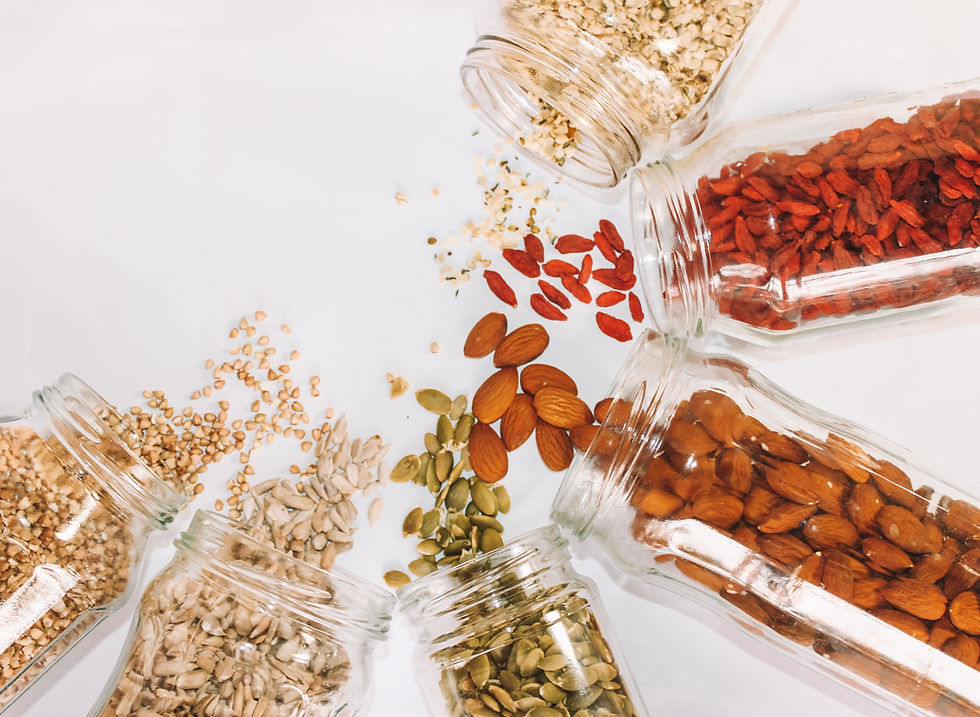Sustainable Storage Alternatives
- Leila Williams

- Apr 15, 2022
- 3 min read
Updated: Feb 5, 2025

Mark your calendars, everyone; Earth Day is coming up on April 22nd! The first Earth Day was held on April 22nd, 1970, and was created to launch awareness on protecting and preserving our planet. More than one billion people participate in Earth Day activities each year to highlight environmental issues. And in this blog, we're going to help YOU participate:) Every product purchased has an environmental footprint, from the materials used to create it to the pollution emitted during manufacturing to the packaging that ends up in landfills. We've put together a guide with some fantastic sustainable and eco-friendly materials along with the perfect ways to use them to make choosing sustainability easier!
Fabric and Natural Fibers
Fabric and natural fibers like ethically sourced cotton, bamboo, rattan, sisal, and seagrass are great sustainable and renewable options. These materials are most often woven into baskets that are perfect for storing large and loose items such as stuffed animals, toys, rolled-up papers, or throw blankets. Storage baskets are great organizing items as they can be used in practically every room in your home. Baskets also create a timeless look and are super durable. Wooden wicker products are also great sustainable options often made into baskets. 'Wicker' is not actually a material but the weaving process, so always be sure to check that the wicker products are made from all-natural, non-synthetic wood that is sourced responsibly.
Bamboo
Bamboo is renewable due to its fast growth and has become a popular sustainable option across home and fashion products, from storage bins to utensils, cutting boards to flooring, furniture to clothing. It's also sturdy, durable, biodegradable, and compostable!! Small bamboo trays and containers work well to organize various drawers throughout your vanity, desk, and kitchen areas. The Australian company ‘Tidy af’ is an excellent example of what sustainable bamboo organizers look like and their many uses.
Glass
Glass isn't biodegradable but, when recycled properly, can be manufactured into new products over and over again. This makes glass containers a great sustainable choice. Glass products are food-safe and won't leach toxic chemicals or absorb food odors and colors making them perfect for storing fridge food or dry pantry items. Some store-bought foods and sauces are even sold in mason jars that can be reused. You can also buy glass storage containers from many kitchen supply stores, or instead, opt for groceries that come in glass containers and slowly build up your mason jar collection.

Ceramic
If glass isn't really your thing or doesn't quite fit the aesthetic of your home, try ceramic products! Ceramic containers have similar benefits to glass in that they are suitable for food storage and pantry items. Ceramic is a food-safe material that won't leach toxic chemicals or absorb food odors and colors. Ceramics are also made from clay which is an abundant raw material that naturally exists in the environment. Unfortunately, regular old grocery store food products aren't normally sold in ceramic containers, but Pottery Barn and craft stores like Michaels are sure to carry plenty of ceramic products perfect for any aesthetic!
Stainless Steel
Like glass, stainless steel isn't biodegradable but is still 100% recyclable. It's lightweight, resistant to corrosion, and won't react to acids in foods stored or cooked in it. Stainless steel products are best used for kitchen products like lunch containers, cookware, and straws but can still look sleek and stylish throughout your entire home. Try looking at Target or Walmart for stainless steel products or head to your nearest kitchen supply store.
Repurposed Items
Upcycling is a great way to repurpose old items and get more use out of them. Turning clothes into totes, using shoeboxes for crafting supplies, or tin cans for jewelry are just a few creative ways to turn tired items into great new products. This allows individuals to reduce their waste going into landfills and find uses for things that may otherwise be sitting around doing nothing. When organizing, take stock of all the products you already own and try to use them around your home first. If you find yourself missing some necessary organizational pieces, always check with friends, thrift stores, and Facebook resell groups before shopping for new items.
Final Quick Tips:

The Container Store website has an entire section dedicated to sustainable products
Always try to use stuff you already have and avoid buying new items
The changes you make to live a more an environmentally responsible lifestyle, however small, are still impactful :)




Comments